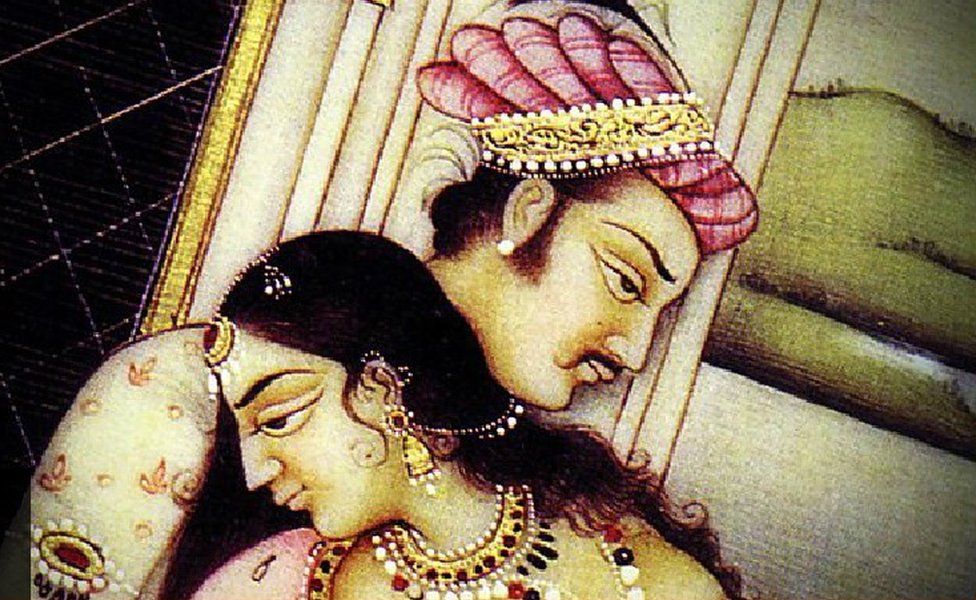Is Kama Sutra a feminist book of erotic love?
- Published

Does the world's oldest textbook of erotic love need to be redeemed and accorded its proper place as a literary landmark of India's rich heritage?
American Indologist Wendy Doniger, who teaches at the University of Chicago and has written nearly half a dozen books on Hinduism, believes so.
But why? After all, Kama Sutra, written in Sanskrit - the literary language of ancient India - by Vatsyayana, who claimed to be a celibate himself, is possibly the most celebrated treatise on love and sex.
Google Kama Sutra and it spits out more than 14 million results in less than a second. There are Kama Sutra condoms, toys, wristwatches, apps, chocolates, a TV series and films. Cosmopolitan magazine published Cosmo Kama Sutra, offering "12 brand-new mattress-quaking sex styles".
This may be part of the reason why Doniger, who has also written a translation of the Kama Sutra, is looking to rescue the book from the "enormous misunderstanding in which most people hold it".
"They think it is a silly book about sexual positions, or a dirty book about sexual positions, and they are embarrassed to read it," Doniger tells me.
Sophisticated
"I want the reading public to know that it is a fascinating book about the subtle interactions between men and women in a highly civilised world, that it is full of profound psychological observations and very good advice about how to get married, how to stay married, and, yes, how to commit adultery."
The result is Doniger's compelling new book The Mare's Trap, published by Speaking Tiger, which attempts to change the conventional understanding of Kama Sutra as a kooky book on sex and improbable sexual positions.
In her telling, the Kama Sutra is a sophisticated and courageous text, which assumes a kind of sexual freedom for women that would have raised the hackles of today's puritanical censors.
For one, for most of his book, Vatsyayana ignores the idea of sex for procreation and is only concerned with the sexual goal of pleasure.
In a way, he challenges the dharma (the moral duties and responsibilities of a Hindu) of fertility, laid down in an ancient Hindu text, the Manusmriti, which says the man has a duty to have sex with his wife during her fertile period.
Kama Sutra is also less judgemental about adultery, writes Doniger.
Vatsyayana actually devotes a whole chapter to "acute instructions to the man who wishes to commit adultery, detailing hundreds of stratagems by which he may sleep with the wives of other men".
At the same time, he is conflicted about adultery, pulling back at the end, and warning the men not do it, and guard their wives.
Kama Sutra, says Doniger, is also far more "open-minded" than Manusmriti about women's "access to household funds, and about divorce and widow remarriage". The absolute power that the wife in Kama Sutra has in running the household's finances stands in contrast with Manusmriti's statement that a wife "should not have too free a hand in spending".
Also, she argues, that Vatsyayana's arguments in favour of the female orgasm are "far more subtle than views that prevailed in Europe until very recently".
He also rejects traditional patriarchal line of ancient texts that recommend cruel punishment for any woman who sleeps with a man other than her husband. Kama Sutra is equally informative about women's thinking about ways of ending an affair, reveals surprisingly modern ideas about gender, is completely non-judgemental about homosexuality and has remarks that point to bisexuality.
'Surprisingly modern'
"The Kama Sutra's ideas about gender are surprisingly modern, as we have already seen, and its stereotypes of feminine and masculine natures are unexpectedly subtle," Doniger writes.
"It also reveals attitudes to women's education and sexual freedom, and non-judgemental views on homosexual acts, that are strikingly more liberal than those of other texts in ancient India - or, in many cases, contemporary India."
So is Kama Sutra a feminist book of erotic love?
"I wouldn't call it a feminist book in the strict sense, as its primary purpose is not to argue for women's rights, and much of it is addressed to men, with advice to them about ways to manipulate women," she tells me.
"But it is also useful, I think, for feminists in its arguments about the equality of women, their equal claim to sexual pleasure, a woman's right to live with a husband who is compatible with her interests and talents, and much else."
Doniger believes that this "astonishingly sophisticated book" - which was already well known in India at a "time when Europeans were still swinging in trees, culturally and sexually speaking" - is very relevant today.
"The basic psychology strikes true again and again, and the level of sexual violence in our world cries out for a book like this to teach us how to control the dark side of sexual impulses and respect the feelings of our sexual partners; in particular, it cautions men against precisely the sort of uncontrolled sexuality that is too often expressed in rape. So yes, I feel it is very relevant to the 21C."